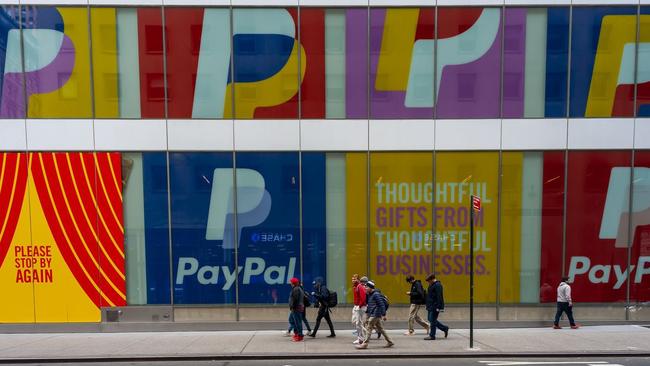Apple leads slide in global and local tech stocks
Global and local tech stocks slid across the board this week, with Apple alone losing nearly $US180bn ($247bn) in one day.

Global and local tech stocks slid across the board this week, with Apple alone losing nearly $US180bn ($247bn) in one day, and Australia’s “buy now, pay later” market darlings facing a new challenge in the form of competition from payments giant PayPal.
The tech-heavy Nasdaq — home to Australian software maker Atlassian — fell 5 per cent on Thursday, in its biggest one-day fall since June 11. Big Tech led the way, with Facebook falling 3.8 per cent, while Tesla fell 9 per cent, days after it completed a five-for-one stock split. Atlassian fell 5 per cent, and lost another 2 per cent after hours, wiping about $US2bn from its valuation.
That’s nothing compared to Apple, which completed a four-for-one stock split last month. The iPhone maker lost $US179.92bn of its market capitalisation, marking the biggest single-day drop for a US-listed company on record.
The mass sell-off marked a pullback for technology stocks, which had largely buoyed the market since the coronavirus pandemic hit in March.
It was also a tough week for Australia’s BNPL stocks, which bore the brunt of an announcement from California-based heavyweight PayPal that it, too, was entering the red-hot market.
PayPal announced a Pay-in-4 functionality in the US market, which will allow customers to split purchases of between $30 and $600 into four repayments over six weeks. Like Afterpay, customers won’t be hit with interest charges, but may have to pay a late fee.
PayPal’s functionality will also be similar to Afterpay, in that the Pay-in-4 option will appear in a customer’s PayPal wallet so they can choose it at checkout.
“With Pay-in-4, we are building on our history as the originator in the ‘buy now, pay later’ space, coupled with PayPal’s trust and ubiquity, to enable a responsible and flexible way for consumers to shop while providing merchants with a tool that helps drive sales, loyalty and customer choice,” PayPal Global Credit senior vice-president Doug Bland said.
The announcement sent Australia’s BNPL stocks spiralling: Afterpay was down 8 per cent; Zip 13 per cent; and Sezzle down nearly 15 per cent on Tuesday. They each fell 5-7 per cent further on Friday.
Sezzle boss Charlie Youakim moved to reassure investors and told The Australian: “We have always expected further competition in the ‘buy now, pay later’ space and we are more than prepared for it. This is why we’re constantly evolving and adapting to the needs and wants of our consumers.
“The BNPL sector in the US is very nascent compared to Australia and there is more than room for multiple players. BNPL makes up just 1 per cent of the e-commerce payment mix in the US (in Australia, it’s 8 per cent). E-commerce comprises just 12.5 per cent of the $5.4 trillion retail market. The market is enormous.”
Afterpay co-founder Nick Molnar is similarly unfazed by new competition, declaring there’s room for everyone.
He said despite the banks slowly moving into the space, as Commonwealth Bank had done with its Klarna tie-up, PayPal wasn’t an existential threat to the likes of Afterpay.
“There are many providers that started life as a traditional finance company and have attempted to come down into the Afterpay space, and the inability to have the purity of business model and mission and vision that we have truly does differentiate us,” he said.






To join the conversation, please log in. Don't have an account? Register
Join the conversation, you are commenting as Logout